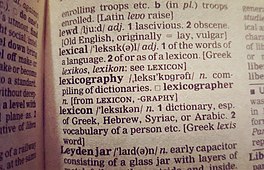Documentation:RelLex/Guzāgi K'ū́gé' – Our Language Book: Nouns (Kaska, Mountain Slavey, and Sekani)
Guzāgi K'ū́gé' – Our Language Book: Nouns (Kaska, Mountain Slavey, and Sekani)
| Relational Lexicography Knowledgebase | |
|---|---|

| |
| About RelLex | |
| An index of under-resourced North American language references, including print and digital dictionaries. | |
| Browse by | |
| About the Knowledgebase | |
| Find our filterable Knowledgebase of dictionaries and lexicography technology at https://knowledgebase.arts.ubc.ca/. | |
Language Name
Kaska, Slavey, Sekani.
Alternate Language Names
Kaska: Dene Zā́gé'.
Mountain Slavey: Mountain Dene, Northern Slavey, Sahtúot’ı̨nę Yatı̨́, Slavi, Slave, Dené, Mackenzian.
Sekani: Tse’khene, Tsekan.
Region
British Columbia, Yukon, and Northwest Territories, Canada.
Who
Kaska Tribal Council (Publisher).
Others Involved
Mike Abou, Louis Boya, Alfred Jakesta, Angel Carlick, Mida Donnessey, Clara Donnessey, Liza Magun, Julia Allen, Alfred Caesar, Minnie Caesar, John Dickson, Mary Charlie, Charlie Dick, China Sterriah, Grady Sterriah, Arthur John, Alice John, Rosie Ollie (Elders); Dennis Porter, Ann Mercier, Aggie Magun, Barbara Morris, Jocelyn Wolftail, Leda Jules, Josephine Acklack, Grady Sterriah, Doris Bob, William Atkinson, Mary Charlie (Language Professionals); Laurie Allen (Wordlist Preparation); Marie Skidmore (Revisions); Sharon Hargus, Keren Rice (Linguistic Assistance); Peter Long (Formatting and Maps); Pat Moore, Sharon Hargus (Recording); Pat Moore, Angela Wheelock (Editing); Chief Hammond Dick, Chief Ann Bayne, Chief Norman Sterriah, Chief Annie Boya, Chief Emile McCook (Political Support); the Fort Ware Indian Band, the Dease River First Nation, the Lower Post First Nation, the Liard First Nation, the Ross River Dena Council (Support); the First Peoples Cultural Foundation, Aboriginal Language Services Yukon (Funding); the Canada/Yukon Cooperation and Funding Agreement on the Development and Enhancement of Aboriginal Languages (Sponsor).
Publishing Information
Published 1997 by the Kaska Tribal Council.
How People are Cited
People are cited in the Introduction.
How Information is Cited
Speakers are cited by name and community in the Introduction. The four pages prior to the Introduction include photos of some of the speakers, including Louis Boya, Alfred Jakesta, Angel Carlick, Mida Donnessey, Liza Magun, Alfred Caesar, John Dickson, and Arthur John Sr. Previous publications and language data are also cited in the Introduction.
Where is Information Coming from
Information in this dictionary mainly comes from speakers. This dictionary also utilized the fieldnotes and recordings of Pat Moore and Sharon Hargus. A critical previous publication used in the creation of this dictionary is Hargus' The Fort Ware Sekani Topical Dictionary (publication date unknown).
Tools and Framework used
This dictionary is available as a physical book.
Access
This dictionary is accessible through libraries.
Included Languages and Directionality
English to Kaska, Sekani, and/or Slavey (specially Mountain Slavey).
Dialects Included
This dictionary includes information from the Fort Ware, Lower Liard, Dease Lake, Good Hope Lake, Upper Liard, Frances Lake, Pelly, and Ross River dialects of Kaska, and the Mountain Slavey/Mountain Dene dialect of Northern Slavey as spoken in Ross River. No dialects are specified for Sekani.
Type of Dictionary
This is a multi-lingual, mono-directional, topical dictionary.
How are Entries Organised
Entries are organized topically. Topics include Living Things, People, Natural Phenomenon, and Culture and Technology, and each has several, more specific sub-topics. Sub-topics are introduced by a short passage in Kaska related to the topic that provides cultural orientation. These passages are written in Kaska and English. Entries include the English headword and the translations in the different languages and dialects. There is a space between words that are very different from other languages/dialects. Entries may also include derivational forms of the word in English and its translation in the different languages and dialects. Many entries also include an example sentence in Kaska, followed by its English translation.
The frontmatter includes the sound systems of consonants and vowels of Kaska, Mountain Slavey, and Sekani. There is also a section on the dialect differences of Kaska.
Other Features
| Feature | Included | More Information |
|---|---|---|
| Guide to use and understand | ✅ | A description in Format of Dictionary Entries on pp. 29–30 |
| Audio | ❌ | |
| Images | ✅ | Occasional photos in entries |
| Example phrases | ✅ | At the end of the many entries |
| Speakers marked | ❌ | However, each sub-entry intro is credited to a specific speaker by name and dialect |
| Dialects marked | ✅ | Dialects are written in uppercase letters next to the entry |
External Links
Reference on WorldCat: https://worldcat.org/title/39381088
This dictionary is referenced on p. 13 of John Alderete and Thomas McIlwraith's "An Annotated Bibliography of Tahltan Language Materials" (2008), Northwest Journal of Linguistics, Vol. 2, No. 1: https://www.sfu.ca/nwjl/Articles/V002_N01/AldereteTahltanBiblio.pdf